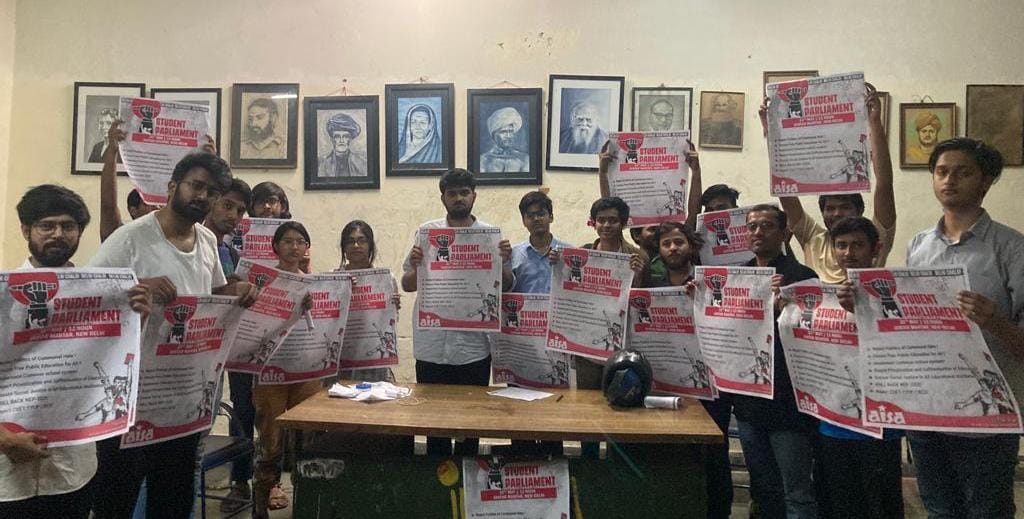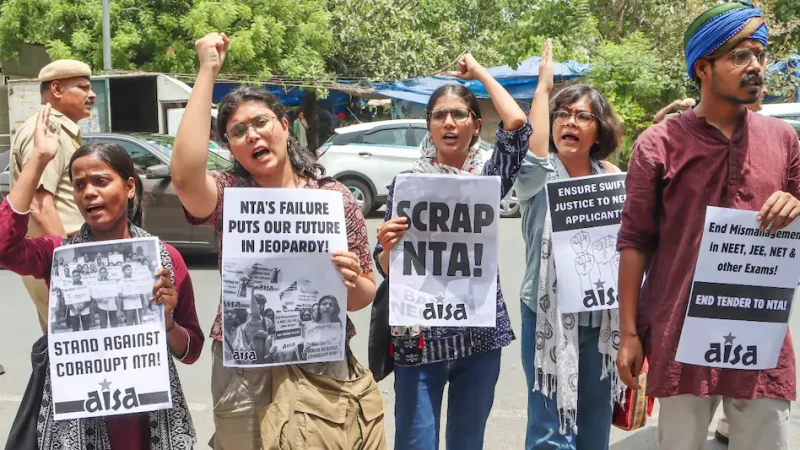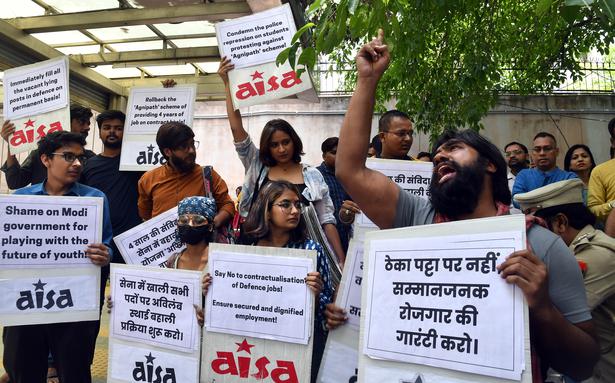‘Student Parliament’ to be Held on 31st May to Demand Roll Back NEP-2020.

Government bulldozed anti-farmer farmers’ bills in parliament. The farmers movement forced them repeal it. Let us build a similar students’ movement to get NEP ROLLED BACK.
What does this National Educational Policy (NEP) 2020 signify? Does this shift in policy benefit you? The answer depends on who you are. If you are a student, teacher and a parent, No. If you are private profiteer, definitely yes. NEP 2020 was bulldozed unilaterally through a press conference without being placed in the parliament. The performance of Modi government in last 6 years in the field of education is riddled with disparate attempts at fund cuts, seat cuts, scuttling of reservations, increasingly vacant faculty positions and their rising contractualisation, and increasing dominance of corporate and private players in higher education. NEP is their most organised attempt to further intensify all of these. NEP is being pushed by Modi government through syllabus cuts in 10th and 12th classes, saffronisation of courses and destruction of university system. It simply is a national policy to destroy quality, public education and accelerate the exclusion of the middle and lower classes from higher education.
NEP means Online Education
The NEP final draft mentions the words ‘online’ and ‘digital’ nearly 50 and 38 times respectively. The covid lockdown has clearly shown how online education is exclusionary for majority of students who lack basic devices and infrastructure to access them. Without any help from the government, only a very limited section of students could meaningfully learn anything and the overall quality of education fell down drastically in even the best of universities. The lesson is clear that any replacement of classroom teaching with online classes is an extremely flawed idea. Even then the NEP proposes to make online classes a permanent component of university teaching which is suicidal for Young India’s aspirations for getting educated like the UGC proposes Swayam model of blended mode of teaching of 60-40 offline-online education model.
NEP means Loan Model of Education and Massive FEE hikes
Grant Model to Loan model of Funding In the whole document public funding is only mentioned twice. It is because the idea is to promote Loan model of education. Higher Education Funding Authority (HEFA) will be the authority established to loan money to the universities to build new infrastructure like hostels, buildings, class rooms, labs and other infrastructure. HEFA has a tie up with Canara Bank and Ministry of Education. Who will repay this loan? Students. How will students fund their education? By taking education loans.
The loan system is bound to lead to hike in university fees by upto 5-10 times. One can compare the fee structure of a public university like JNU and Private University like Ashoka for example (MA course in JNU cost Rs 283 per year, on contrary in Ashoka it costs nearly 4 lakh rupees). It must be asked that when the economy of our country was many times smaller than today, the government could still afford to fund our universities, then why today, when we boast of having become a global economic superpower, can we not fund them? In an era of rising unemployment rate, forcing students to take loans to pay the hiked fees will further burden them with economic, social and mental stress.
Academic Councils replaced with Board of Governors
Academic Councils and Senates will be replaced with government appointed Board of Governors (BoG), who will be “independent” and will have complete decision-making powers in academics, financial matters and appointments. This will allow corporates to dictate university policy and curriculum for their own benefit. This BoG will have complete freedom i.e. financial freedom to decide the price of the degree student will pay to get educated meaning massive Fee hikes.
NEP’s Choice Based Credit System and Four-Year Bachelors Programme is graded inequality and exclusion
NEP 2020 imposes choice-based credit system with a multiple entry/exit four-year undergraduate programme. On the face of it, it seems that the four-year multiple entry/exit programme provides options to students where the student can exit after studying first year, or second or third with a certificate or a diploma depending on level of exit. However, this choice-based policy is nothing but a system of graded inequality and exclusion, which will lead to drop outs of the poor and marginalised. The students of the middle and lower classes would be forced, owing to high fees, to drop out early with a certificate or a diploma with an assortment of foundational courses while specialisation and research-based component will be assessable to those who can afford to pay for the education of the fourth year. Also, very few elite colleges will offer the fourth year while majority of them will be turned into degree colleges dispensing with generalised education.
NEP 2020 means Exclusion
School and College Closure
NEP 2020 demands government schools and colleges to be permanently closed. The logic of starting a large multidisciplinary university called Higher Educational Institutes (HEI’s) in higher education by closing colleges/institutes with less 3000 student’s strength is dangerous. This is a mockery of the constitutional provision of Right to Education as rather than extending the number of quality public school the government would give up on its responsibility itself. Similarly, starting of School Complexes through grouping formula by closing down schools lacking proper teachers is a death sentence to women, common people, marginalised and the poor.
Introduction of Mother Tongue education till 5th Class
NEP stresses on introduction on Mother Tongue but doesn’t clarify if teaching in mother tongue would be mandatory for private schools along with government school. If private schools are exempted then we would have two classes of students: one who can afford the private schools will be English educated and those who part of the government school system will be schooled in their mother tongue. The latter might miss out on opportunities, leading to further marginalisation and exclusion.
NEP 2020 is Pro- Caste System and annihilates RESERVATION AND SOCIAL JUSTICE
Reservation is not even mentioned once in the whole scheme of document of NEP 2020. Considering the stand of RSS-BJP on wanting to annihilate reservation and decimate social justice policies, NEP 2020 is not surprising.
NEP 2020 will cause 40% job losses for Young India
Implementing NEP 2020 means 40% of jobs both in teaching and non-teaching sector will be lost permanently to digital modes, thereby furthering the unemployment and misery of Young India. NEP 2020 promotes contractualisation as education would be shifted to online mode, thereby not recruiting permanent faculty and also increasing work load on existing teachers.
NEP demands academic homogeneity
NEP 2020 is bringing a unified single entrance examinations to all universities like CUET for Under Graduation courses just like a NEET in medical and IIT-JEE for engineering. We have seen how NEET and other common entrance examinations are against students from rural India and pro-coaching centres. This system will destroy the autonomy and credibility of institutions and strengthen the hands of corrupt middle-men and coaching mafia.
NEP Violates Federalism and Constitution
Education is on the concurrent list i.e. both the subject of state and centre. Yet NEP focus is on dictation, not cooperation. It demands obedience from states to follow the policy. Just like the three-language policy and promoting Sanskrit as a classical language at the cost of other classical languages like Telugu, Tamil and others only shows, the disdain for federalism and regional languages. NEP ventures federalism by scuttling it, by promoting a unitary structure.
NEP is Anti-Research
NEP 2020 has eliminated M.Phil. degree which is a training ground for a Ph.D. and has its own value and contribution towards research. Removal of M.Phil. also means further seat cuts and denial of opportunities for students from marginalised backgrounds to use the degree as a stepping stone for research. Students after all often bank on this degree for employment and then proceed to a Ph.D. when they have more financial security.
Recognizing the malicious nature of NEP 2020 in fostering a national education system that would promote systematic exclusion, attack the principles of social justice at all level and reinforce the inequalities based on class, caste, gender and religion amongst many others, AISA has initiated #RollBackNEP campaign across the country. The campaign will be culminating at Jantar Mantar in Student Parliament on 31st May 2022 with demand of rolling back the disastrous anti student, pro corporate NEP 2020.





